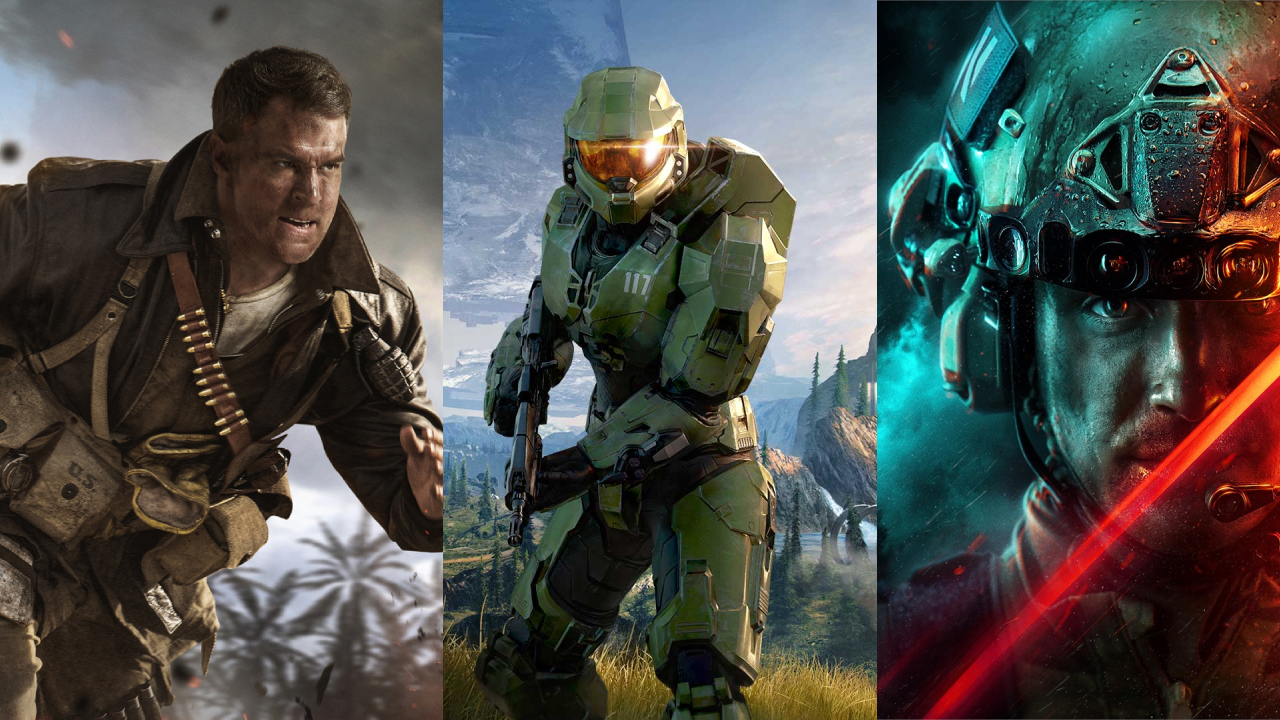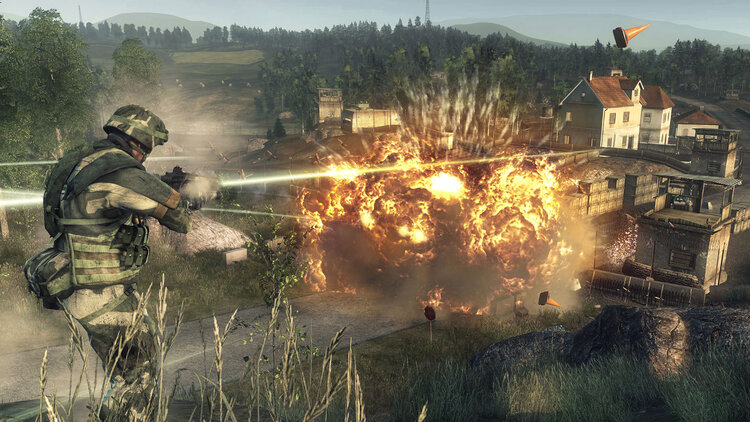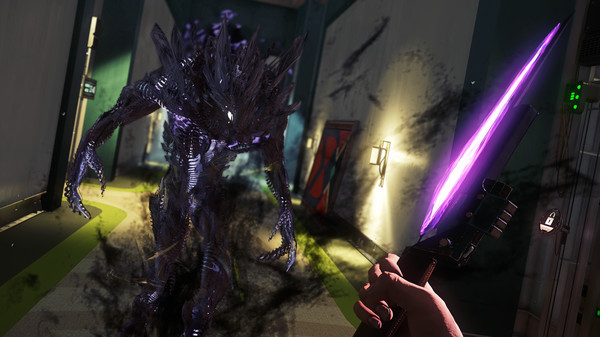FPS games suck right now — but a renaissance is coming
Battlefield 2042, Call of Duty: Vanguard, and Halo Infinite failed to innovate — but don’t lose hope

Not too long ago, I booted up Respawn Entertainment’s Titanfall 2. It was my first time playing 2016’s esteemed first-person shooter with an engagingly interweaved mecha twist, and I was only drawn to it after seeing the high praise it received from, well, every website that has a “best FPS games” list. From the bond between in-the-works Pilot Jack Cooper and the ever-endearing Titan BT-7274 to the engaging twists in gameplay mechanics (e.g., shifting through time streams to gain an advantage over gun-toting foes, I was completely enamored by its campaign. Oh, and the absolutely wicked high-flying jumping, wall-running, and sliding action with full-on mechas trading blows in the background.
It’s one of the best FPS games around, and one of many in my backlog of PC shooters I finally get to play on a gaming laptop. You see, before coming to Laptop Mag, I found it tricky to get my hands on a reliable device to play the latest and greatest from the genre: either getting a taste of Call of Duty: Modern Warfare (yup, the first one) on a pal’s gaming rig or playing the console version of the likes of Bioshock. That’s not to say I didn’t get the full experience on a console, but there’s a reason why esport-level FPS hits like Counter-Strike: Global Offensive or Valorant shine on PC — mouse and keyboard rules.
After wrapping up my throwback playthroughs last year with what might be the best FPS franchises of all time, Halo and Half-Life (I can still recall Laptop Mag’s Jason England’s bewilderment of not having played the latter), I turned to more current-gen titles. A fresh stab at WWII warfare that spans the globe in Call of Duty: Vanguard? I’m in. Master Chief cruising around in a Warthog and picking off elties with a grapple hook in Halo Infinite? Stop it. Slightly futuristic gunplay in sprawling 128-player matches in Battlefield 2042? Needless to say, the hype was real.
But then we got to reviewing these Triple A FPS titles:
Not the show-stopping scores FPS fans were expecting, are they? And certainly not “The Best WWII FPS Game” that’s still plastered on the Call of Duty: Vanguard website (SEO reasons, I’m sure). You don’t need us to tell you these games aren’t up to their once high-reaching standard either; the user scores on Metacritic say it all. Better yet, try them out yourself if you don’t believe the collective.
Don’t get me wrong. This isn’t to say I didn’t have a wicked time seeing grunts fly away with well-placed, grapple-hook punch in Infinite or enjoy the fast-food fun of Vanguard’s multiplayer. However, I had the luxury of playing the greats in a short span of time before heading to modern first-person shooters.
Quite honestly, I’ve realized that they suck.
It’s in the numbers
The current slew of FPS games suck not because they’re bad games, but because of the standard these franchises previously set. The thrilling highs of CoD: Modern Warfare’s “All Ghillied Up” or the chills of first encountering The Flood in Halo: Combat Evolved’s “343 Guilty Spark” are memorable masterpieces, offering players more than just “run there, shoot here” mechanics. They were led by interesting storylines, freedom of strategy of knowing what weapons to use, and an overall tense atmosphere players get enveloped in. Even Battlefield: Bad Company’s fun-as-hell, large-scale battles, and fully destructible environments brought a new standard to the genre.
The same can’t be said about these franchises’ latest iterations’ they all simply feel rehashed to a fault. As CPUs, GPUs, and storage capacities improve each year, so too our games. But if this latest group of titles has taught us anything, bigger really isn’t better. Editor Rami Tabari sums this up perfectly for Halo Infinite:
“The open world is a bit of a mixed bag. It captures that Halo spirit, but gets quickly repetitive, saving groups of marines, taking out high-value targets, and capturing forward operating bases. It almost feels like a Ubisoft version of Halo…”
Battlefield 2042 doesn’t fair any better:
“The landscapes are diverse, but felt lifeless in my relatively brief time with the game. Where past games were modest in placing soldiers within a single town, environment, or structure, Battlefield 2042 thrusts you into massive sandbox zones, each with multiple points of interest. It makes for some grandiose moments, but when coupled with the increased 128 player count, rounds can feel overwhelming. “
Don’t get me started on some of Vanguard’s modes either’ playing Patrol in Du Haus with Assault pacing is atrocious. The tight setting turned the game into more of a boring bloodbath.
Look, I don’t believe this is just me gobbling a hefty dose of South Park’s “member berries.” There’s a reason why player count has dropped significantly despite each of these games launching in late 2021. According to analysis website Steam Charts, Battlefield 2042 reached over 100,000 players when it launched, and as of April 2022, averages at over 3,000. Halo Infinite also experienced a plummet in players, reaching a whopping 256,000 players when it launched, down to just over 10,000 as of writing. Despite Vanguard being the best-selling game in 2021 in the US (according to market research company NBD), Activision decided to delay the launch of Call of Duty 2023 since Vanguard "failed to meet expectations."
I blabber on about the three giants, but they aren’t the only culprits. Does anyone remember the release of CrossFireX? You know, the one that Control and Max Payne developers Remedy Entertainment worked on? It’s a disappointing, low-budget-feeling mess that haphazardly smushes together what publisher Smilegate thinks makes a great shooter. Then there’s Back 4 Blood, which does an adequate job of delivering bloody co-op zombie action, but failed to deliver the outstanding highs and intricate details of Left 4 Dead (the musical monster cues are a big miss).
But what about the critically acclaimed Deathloop? This was secretly my most anticipated game of 2021; I adored Arkane Studios’ Dishonored series, Prey, and its extremely underrated DLC, Mooncrash. Reviewers may have jumped the gun by showering it with high praise. Despite its incredible voice acting, intriguing environments, and freedom of combat, the loop itself turned out to be a hindrance. That, and the dumb-as-heck, uniform AI. A quick glance at its user score on Metacritic is case in point.
Not everything is a total blunder, of course. Necromunda: Hired Gun is a fine game that succumbed to a bug-filled launch, while Shadow Warrior 3 is a wacky, fun ride that delivers a mixed bag of Doom Eternal-esque gameplay (with one too many dick jokes). Then there’s Dying Light 2, which assistant managing editor Sean Riley took a liking to with its “survival-horror parkour” action, and I’m in the same boat. But where are the Titanfall 2’s, the Singularitys, the Wolfensteins, the Half-Lifes, or the Doom Eternals of this decade? Well first, gamers are still going back to play those gems, and second, they can be found in another form that makes bank.
Here comes the next contestants
There is no doubt that the COVID-19 pandemic has played a big role in disrupting the development of recent FPS titles. 343 Industries had to go back to the drawing board before the famously delayed release of Halo Infinite, DICE seemed to be in development hell before announcing Battlefield 2042’s delay, and CoD: Vanguard Zombies felt rushed and incomplete — the status quo of game releases these days. You have to hand it to development teams for pushing out blockbuster titles during difficult times, which makes it more disappointing to see those games take a hit once launched. But, as the world slowly adjusts to post-pandemic life, game studios are looking to shift gears.
From Microsoft’s Activision Blizzard acquisition and Sony picking up Destiny and Halo creator Bungie, the gaming industry is shifting, and hopefully for the betterment of FPS games. Plenty of exciting projects have already been announced or hinted at; from Call of Duty breaking nearly two decades of annual releases to work on Black Ops entry by Treyarch (fingers crossed) to Bungie confirming there’s an Easter egg that teases its next game in Destiny 2. I believe — or more realistically hope — a renaissance is coming: one that learns from the downfalls of recent FPS titles and delivers a hybrid of the innovations fans yearn for and what brings in the money: battle royales.
Even Halo Infinite is tipped to bring in a battle royale mode, which is needed for its lack of multiplayer content. They’re hit and miss, and I admit that I’m absolutely horrible at them. But there’s no denying that one of the best FPS games out right now is Apex Legends and Valorant. Constant updates bring new characters and slight story elements, steady concurrent streamers and viewers, and cosmetic items that make these publishers billions. It’s hard to imagine why game studios would want to make the same gripping FPS games of yesteryear if they don’t make nearly as much cash. Now, Destiny 2 is also a hugely popular shooter, and rightfully so. But its new expansions, elaborate lore, and excessive balancing issues make it difficult for new players to pick up. That’s right, Bungie, your new game is sorely needed to attract new players.
Sign up to receive The Snapshot, a free special dispatch from Laptop Mag, in your inbox.
Final words
As smash-hit games such as Elden Ring and Horizon Forbidden West soar, we may be more in the era of open-worlds rather than story-driven first-person shooters with memorable multiplayer action.
This doesn’t mean we aren’t getting enjoyable and fantastic FPS titles, though. Ready or Not is the surprise tactical FPS many have been craving, Ghostwire: Tokyo took a swing at mixing up the genre with slick hand movements and a beautiful open world, while Tiny Tina’s Wonderland’s brought an endearing D&D twist to the looter-shooter franchise. At the end of the day, however, the great FPS titles aren’t sticking the landing, and a change is needed to recall the grandiose scale the genre frequently achieved.
Maybe it’s a clean, story-driven adventure in the style of Eidos-Montréal’s excellent Guardians of the Galaxy, or the story missions coming up in Overwatch 2. It could just be that I needed Half-Life 3 all along. Either way, plenty of the best FPS games are ready for everyone to play, and I recommend heading back to the classics you may have missed and giving them a go if you’re unimpressed with the current state of FPS titles. It may take time before the next big shooter arrives, but dabbling in best free-to-plays may satisfy that itchy trigger finger.

Darragh Murphy is fascinated by all things bizarre, which usually leads to assorted coverage varying from washing machines designed for AirPods to the mischievous world of cyberattacks. Whether it's connecting Scar from The Lion King to two-factor authentication or turning his love for gadgets into a fabricated rap battle from 8 Mile, he believes there’s always a quirky spin to be made. With a Master’s degree in Magazine Journalism from The University of Sheffield, along with short stints at Kerrang! and Exposed Magazine, Darragh started his career writing about the tech industry at Time Out Dubai and ShortList Dubai, covering everything from the latest iPhone models and Huawei laptops to massive Esports events in the Middle East. Now, he can be found proudly diving into gaming, gadgets, and letting readers know the joys of docking stations for Laptop Mag.




